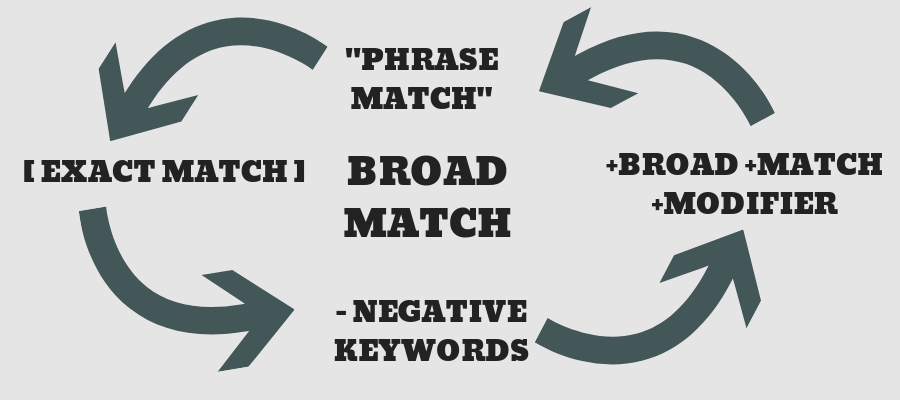
There are a lot of things you have to adjust properly for your campaign to run smoothly, but in this blog post we are going to elaborate more about the keywords and what types there are. In search campaigns it is very important to have a set of relevant keywords that trigger your campaign. The results are relevant clicks and finally a successful campaign.
So, let’s talk about keyword match types.

1. Broad Match
Broad Match, as the word itself says is very broad, and in most cases not the best option for your campaigns, because it will trigger a lot of irrelevant clicks, and spend your money. This is the default match type your keywords are assigned unless you specify another match type. If you decide to have broad match keywords Google will show your ads on relevant variations of your keywords, including synonyms, singular and plural forms, possible misspellings etc. Basicly on everything and we suspect that not everything has the same importance for you? Are we right?
So if you still want broad match, just type the word like cars and you don’t have put any signs in front or behind the word. This will be classified as a broad match.
Let’s say your broad match keyword is cars, here is an example where your ads will trigger: fast cars, racing cars, blue cars, where can I buy a car, cars from the Transformers movie, beautiful houses and cars etc…
Get it? Everything that has to do with cars will trigger your ad…
2. Broad Match Modifier
This is definitely a better way to control your keywords. It will probably increase your clicks and conversions. Broad Match Modifier lets you specify more about how and where you want your ads to show. It ensures your ads to show only when someone searches for synonyms or close variations of your keywords.
So, lets use the cars example again, but this time our keyword is going to be fast cars. If you want your keywords to be classified as a broad match modifier just put sign + in front of each word: +fast +cars.
Here are some examples where your ads will trigger: fast speeding cars, fast automobile, high speed cars… This are all close variations of your keyword, and should trigger your ads to show.
Your ads will not show if someone types: slow cars, fast motorcycle, honda cars…
3. Phrase Match
Your ads will appear when people search your exact phrase. Search terms here can include one or more words before or after the phrase. Phrase match is good because it will increase clicks, but only when someone searches your phrase match or close variants to your phrase match. The word order is very important, which you will see in the examples. If you want your keywords to be classified as phrase match just put the quote marks in front and behind the phrase: ¨fast cars ¨
Here is some example where your keywords may show: black fast cars, buy fast cars at our showroom, big muscle fast cars…
Your ads won’t show if someone types: cars for fast races, cars that are fast, fast vehicles…

4. Exact Match
Exact Match will trigger your ads to appear only when someone searches for the exact keyword or close variations of your keyword. Your ads will appear only when the meaning is the same. For example cooking book or book for cooking, the meaning is the same and your ad will appear on both of those searches but it won’t appear on book for scientists, because the meaning is no longer the same. If you want your keywords to be classified as exact match put them into brackets: [cooking book]
5. Negative Keywords
Yes, there are also negative keywords, they allow you to specify on which terms you don’t want your ads to appear, which can be very useful when optimizing your campaign. We recommend that from time to time you take a look on the search terms. Search term shows what were people really typing when your ads were triggered. If you see something that is irrelevant for your campaign or brand in the search terms, just put it on a negative keyword list, and your ads won’t appear on those terms.
Here are negative keyword types:
Negative broad match: fast cars
Negative phrase match: “fast cars“
Negative exact match: [fast cars]
We’ll talk more about negative keywords in upcoming blog so stay tuned…
The best way to ensure your campaign are successful is to combine several match types and separate them into different ad groups. Of course monitoring and optimizing your campaign on every day level is a must! Good luck!


